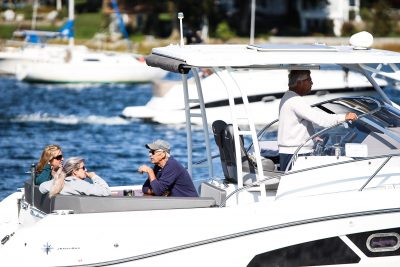Burnout, pandemic fatigue and Zoom exhaustion are invasive facets of student life today at Boston University and colleges across the nation. But as temperatures climb, so do U.S. vaccination doses. And as the days of the semester decrease, so do average U.S. daily positive case counts.

As the summer approaches and hopes for a return to normal soar, BU experts advise students on how to have a COVID-19-safe summer before the planned in-person Fall.
Hannah Emily Landsberg, the director of case management and contact tracing at BU and a Sargent College of Health and Rehabilitation Sciences and School of Public Health graduate, oversees 70 Healthway staff members.
In an email, Landsberg wrote she has seen the number of COVID-19 cases overall moving in the “right direction,” but have not disappeared entirely.
“We still have new cases each day,” she wrote. “We cannot stress enough how important behavior is for bringing down our cases!”
Landsberg wrote it’s important to note that the majority of U.S. citizens are not fully vaccinated — only about 29.5% are. Full protection via vaccination, she wrote, does not happen immediately, but rather two weeks after the second dose for Moderna or Pfizer and after the first dose of the Johnson & Johnson vaccine.
“I urge people to keep in mind the timing of their vaccines,” she wrote. “We have seen cases who receive their first dose and then travel a few days later and contract COVID.”
Even with the vaccine, however, there have been a small number of breakthrough cases, she wrote. She added communicating with non-vaccinated friends and family about their comfort level is also very important, because vaccinated individuals can still potentially contract and spread COVID-19 to others.
Dawn Belkin Martinez, a clinical associate professor and associate dean of equity and inclusion in the School of Social Work, emphasized the importance of caring not only for oneself, but for other communities during this time.
“We need each other to care for ourselves,” she said. “That’s a really significant mental health intervention. I think we need each other, we need other people.”
Though the vaccines offer a chance to return to normal, Belkin Martinez said acknowledging personal limits is important through these adjustments. For instance, though it is tempting to push aside personal reservations to go along with group plans you’re not comfortable with, indulging in an experience without being “grounded and centered” will have a negative impact, she said.
“If I was 18 years old and everyone was like ‘come on, come on Dawn, come on, let’s go to the restaurant,’” she said, “and I went even if I wasn’t feeling okay, that experience is probably not going to be very … enjoyable for me because I’m going to be worried the whole time.”
David Hamer, professor of global health and medicine, is part of several COVID-19 related advisory groups, including the University’s Medical Advisory Group and the Vaccine Preparedness Group.
Hamer said in the Fall, the University hopes to return to “back to more normal operations,” though he said there will likely still be a mask mandate in places like classrooms.
He added the University’s plans are very contingent on vaccinations, and BU hopes to buy and distribute vaccines again soon, especially given the lingering questions regarding students’ access to doses.
“Students coming in from outside the country, if they’re coming from New Zealand or Australia or someplace where there’s basically no transmission, they may have very limited access to the vaccine,” he said. “There’s a number of additional questions.”
Hamer said he’d also encourage students to stay “cautious” this summer despite the vaccine, especially in the last few weeks before returning to campus.
In terms of recovering from burnout, Belkin Martinez said finding a “balanced life” and knowing what that means to you is an important step. This summer, she’d encourage students to find what fulfills them, she said, “otherwise you just can’t keep going.”
She also said through all these adjustments, it’s important for students to know their limits and to take care of themselves.
“A big piece of the struggle is getting rid of the cop in your head,” she said. “Having a normal response to incredible stressors, right, and that it’s okay to not give your classes 100% right now if other things are feeling more comforting for you.”


























































































































